Copyright law automatically protects creators' rights to their photos in most countries without the need for registration. However, it could be advantageous to take steps to register your copyright in some countries. In this article, we'll explain how to register the copyright of a photo and protect your ownership by showing the advantages and processes by the example of a registration with the US Copyright Office.
In this piece, you will learn:
1. What is copyright registration?
2. How much does copyright registration with the US Copyright Office cost?
3. What are the benefits of US Copyright registration?
4. Is US photo copyright registration applicable in other countries?
5. US Copyright Office registration online: Checklist
6. What is the online copyright registration process with the US Copyright Office?
7. Do you need a copyright registration to sue?
Conclusion
1. What is photo copyright registration?
Photo copyright registration is the process of legally registering your photographic works with a government agency responsible for copyright protection, such as the U.S. Copyright Office.
To register a photo, you need to submit an application and a copy of the photo to the Copyright Office, pay the applicable fee, and wait for the registration to be approved. Once the registration is approved, you have legal proof of ownership of the photo, which can be used in court in cases against copyright infringers.
It is important to note that copyright protection exists automatically upon the creation of an original work, including a photograph. Copyright registration is not required in most countries. However, in some countries, the registration of a photo will give additional legal benefits.
2. How much does copyright registration with the US Copyright Office cost?
The registration cost for copyright varies across countries. For example, the fees to register a group of photos in the U.S. are $55.
The cost for an individual photographer who submits one photograph to US Copyright Office is $45. The filing fees vary depending on the type of registration being sought and the need for expedited services. Expedited services are available with limited options, and there is usually an additional fee of at least $50, but it's advisable to contact the receiving office beforehand.
Payments and fees can be made through various methods, including electronic deposit, credit card, Automated Clearing House (ACH) debit, check, money order, currency, and bank draft.
For more information about registration fees in the US read the document by U.S. Copyright Office or visit its website.
3. What are the benefits of US Copyright registration?
As photography is becoming more and more of a commodity these days, the importance of copyright increases heavily. If someone uses an image for commercial purposes without a license, it's a serious issue because the photographer is deprived of his or her income.
The Berne Convention states that if you take a unique photograph, you have copyright ownership automatically and immediately upon taking the picture.
If you want to take a copyright infringement to court, the photo needs to be registered with the US Copyright Office beforehand. By registering your photographs with the U.S. Copyright Office, you gain official and admissible evidence that you are the rightful owner of the copyright.
Usually you will want to register your photos in a timely manner to ensure that you may be awarded statutory damages and not just the standard license fees you could realistically have charged for the photo. Statutory damages could be as high as $150,000. A timely registration is also the legal basis of being reimbursed for your own lawyer and court fees by the infringer. A registration is considered a timely registration if the picture has been registered within three months of first publication or if you can prove that you registered the photo before the infringement took place.
This is why it's advisable for photographers to invest time and money into registering their copyrights.
4. Is U.S. photo copyright registration applicable in other countries?
No, U.S. photo copyright registration is only legally relevant for copyright infringement cases treated in US legislation.
Copyright laws vary from country to country, and a lot of countries either do not require any registration or have their own copyright office or equivalent government agency responsible for copyright registration and protection.
However, some countries have reciprocal agreements or treaties with the US that recognize each other's copyrights. For example, the Berne Convention is an international treaty that allows for automatic copyright protection in participating countries, including the US and many others.
If you are a US citizen or resident and you want to register your photo for copyright protection in another country, you will need to comply with that country's copyright laws and registration procedures. It's advisable to consult with a copyright lawyer or the copyright office of the country in question to determine the requirements and procedures for registering your photo in that country.
If you are a non-US citizen and would like to pursue copyright infringement cases before a US court with the option to be awarded statutory damages, you will need to register your photos with the US Copyright Office.
Some countries, such as Germany, the UK, Australia, Ireland, Japan, Poland, Russia, or China, do not have an official register for copyright registration. However, it may be advantageous for residents of these countries to register their images in countries that offer registration, as doing so may grant them access to legal remedies and compensation for copyright infringement in those countries.
5. U.S. Copyright Office registration online: Checklist
To register a copyright for an image, it is important to ensure that it meets the necessary requirements for protection. The following conditions must be met for a photograph to be eligible for copyright:
- The photo must be an original work that shows a minimal amount of creativity and has been created by you. The type of image can range from digital to print, black and white to color, and graphic designs.
- The image must be fixed in a tangible object for at least some period of time, meaning that it must be captured either on film or digitally and cannot be merely an idea or concept.
- You must be the owner of the copyright, except in cases where the photo was taken as part of a work-for-hire agreement, in which case the client usually owns the copyright unless otherwise stated in the contract.
If these conditions are met, you can proceed to register the copyright for your photograph with the U.S. Copyright Office.
6. What is the online copyright registration process with the US Copyright Office?
To copyright your photographs, you have two options: apply online or mail in a physical application. Applying for registration via paper applications takes longer to process compared to applying online, although the required information for it to be legally binding remains the same.
Keep in mind that the process can take eight to thirteen months, according to the US Government Copyright Office.
Here is a detailed outline of how to register your photos:
-
Go to the official Copyright Office website and select ‘Register Your Works.‘
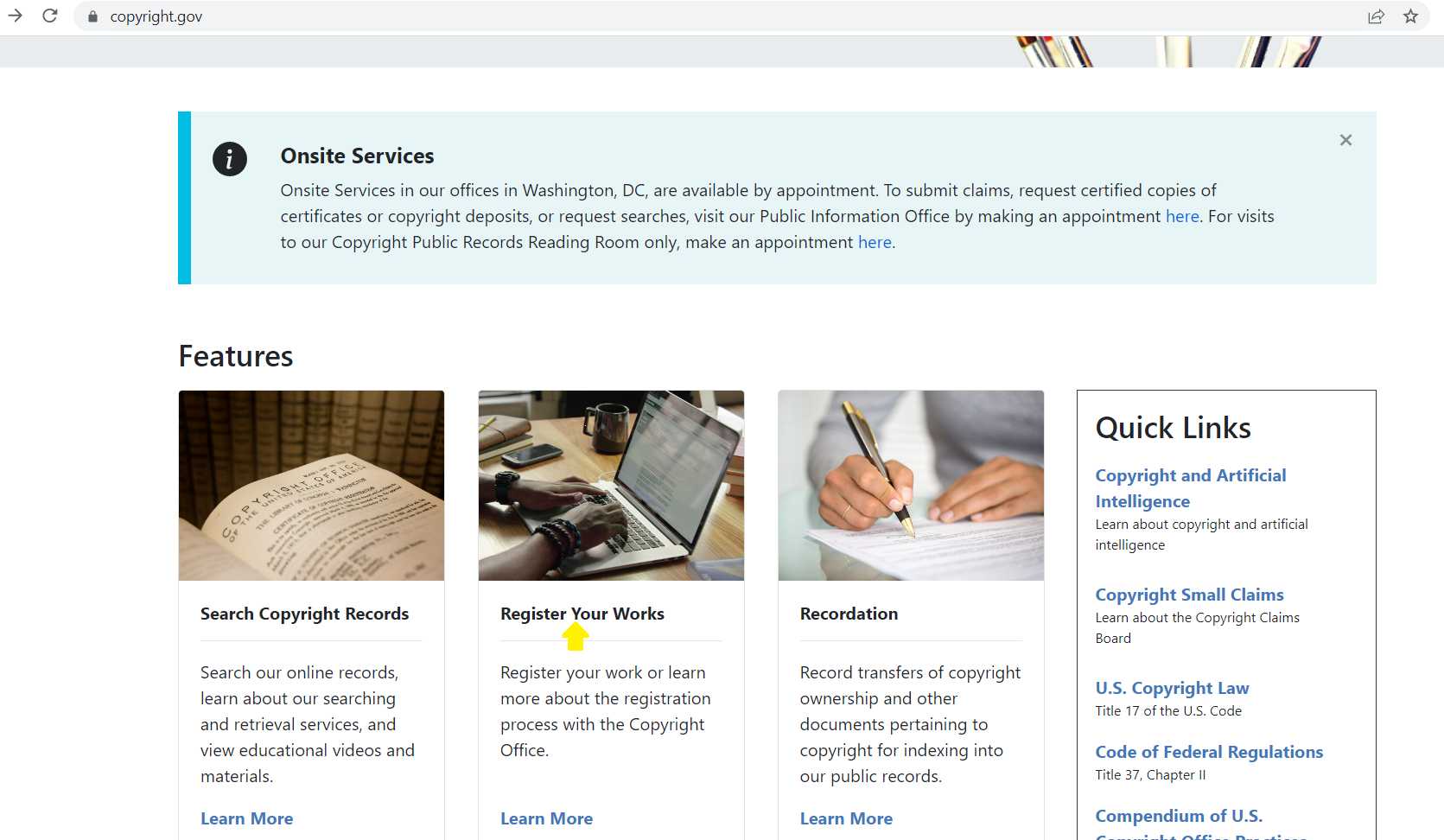
- Follow the on-screen instructions and answer the questions that follow to help the system process your registration.
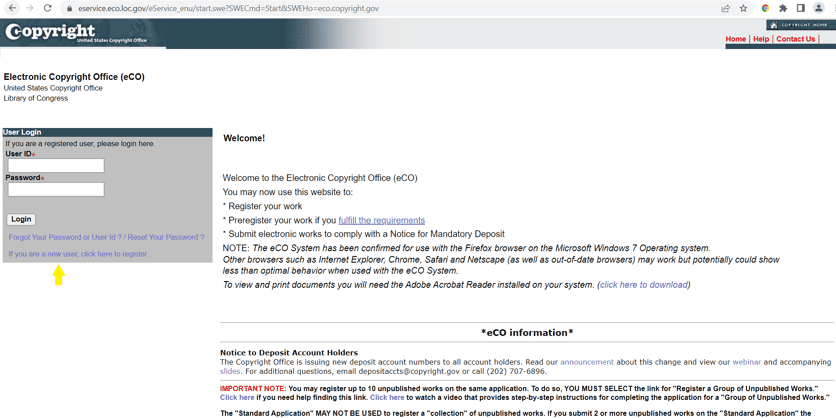
-
Go to the "Register Your Work‘ section and choose an appropriate option for you. You will be able to register a single photo or a set of pictures at once.
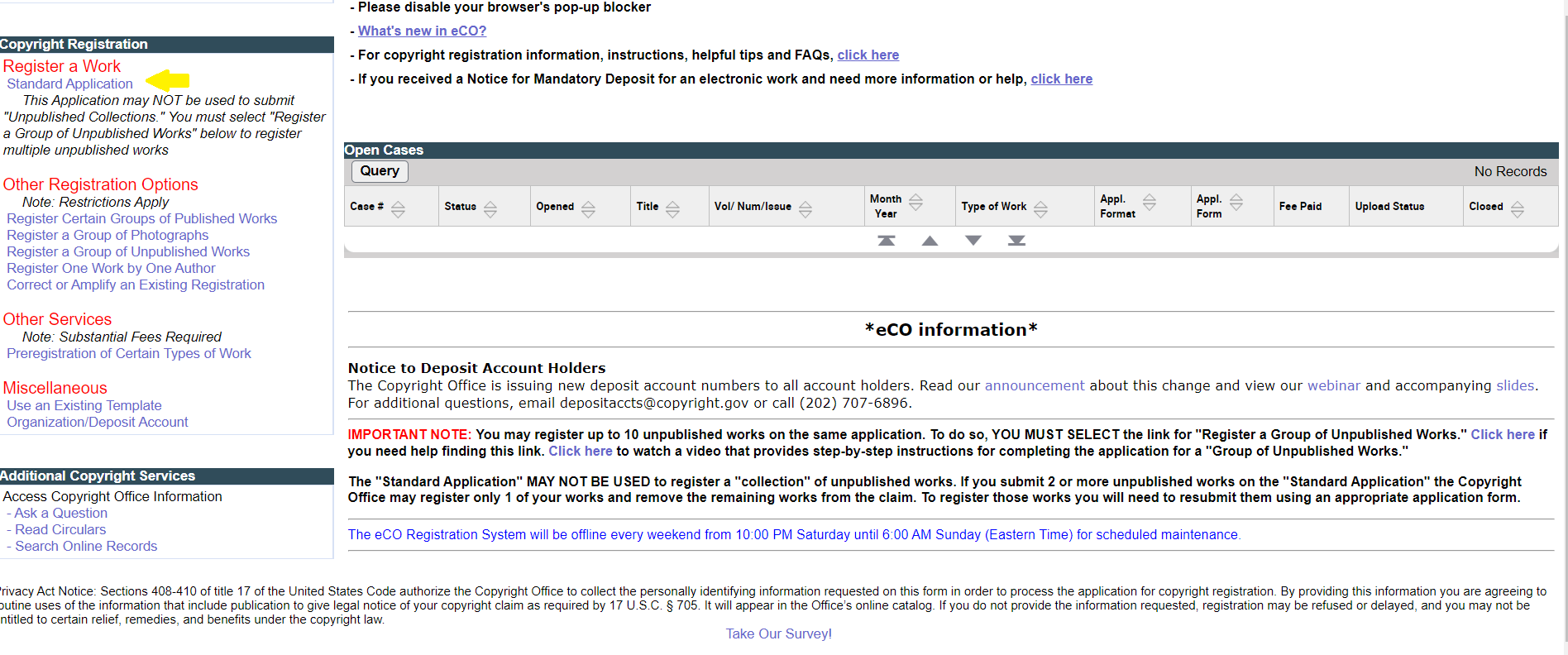
- After that, the website will prompt you to answer questions such as the ‘Type of Work’ you are registering. Photography falls under ‘Works of the Visual Arts’. Confirm that you agree with the regulations displayed and hit Continue again.
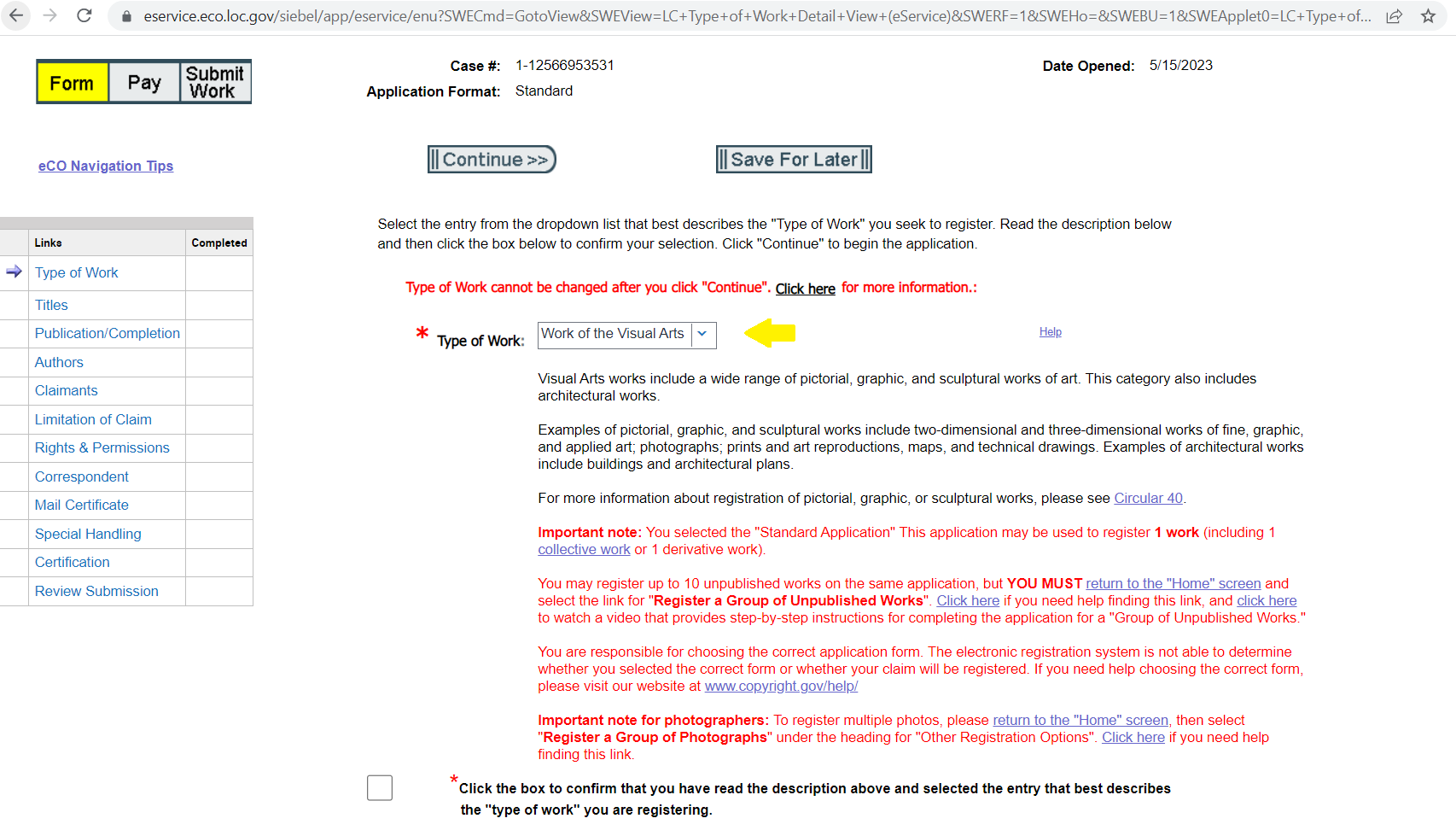
-
Follow the on-screen instructions to complete the online copyright registration form and give your photo a legal title. The next few pages will ask for the author's name and claimants of the work. Provide your contact information in case the Copyright Office needs to contact you. If you want to file anonymously, it is also possible to do so.
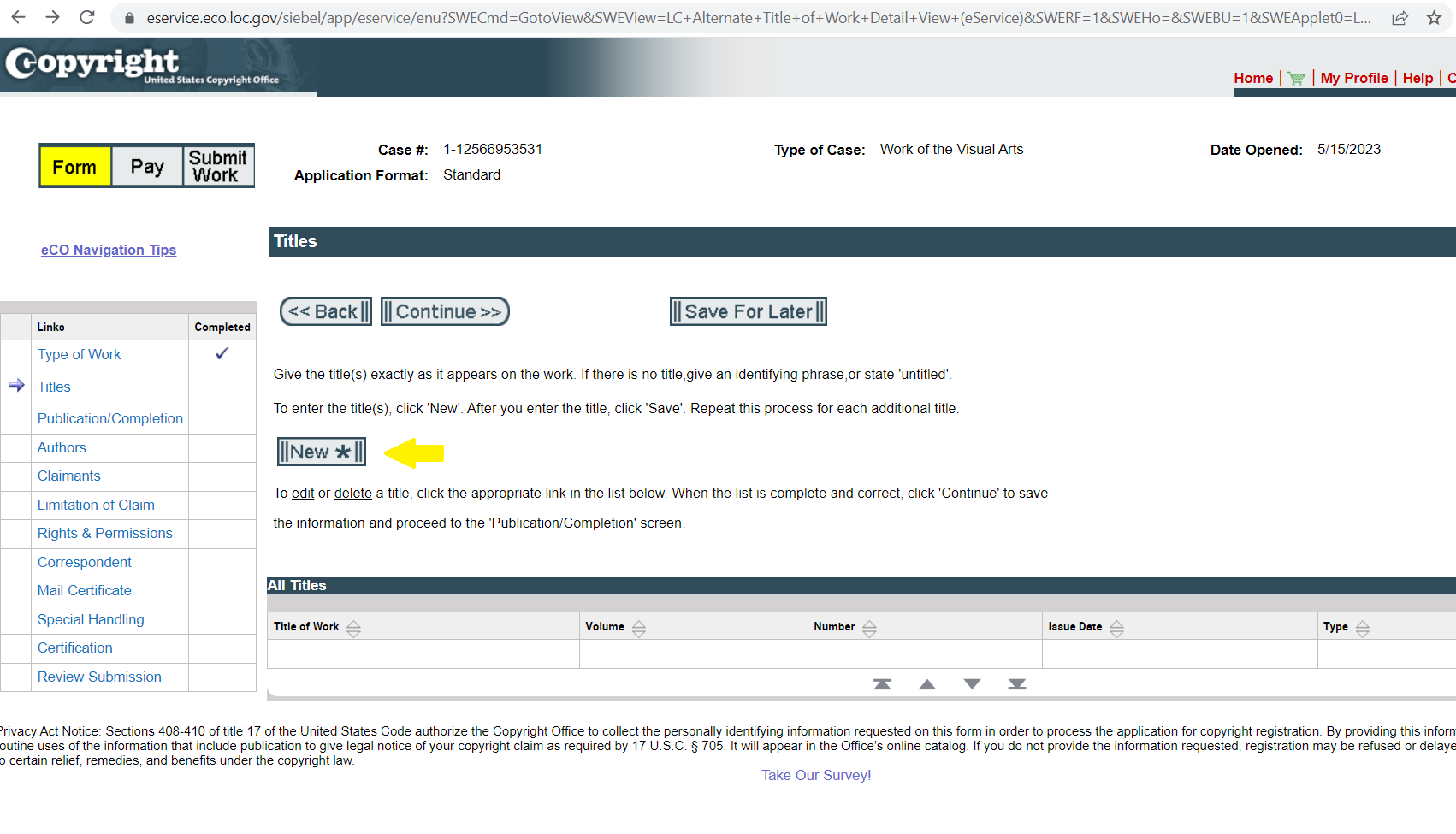
- Once you have completed the above steps, hit ‘Add to Cart.‘ You will be directed to Pay.gov to pay the filing fee.
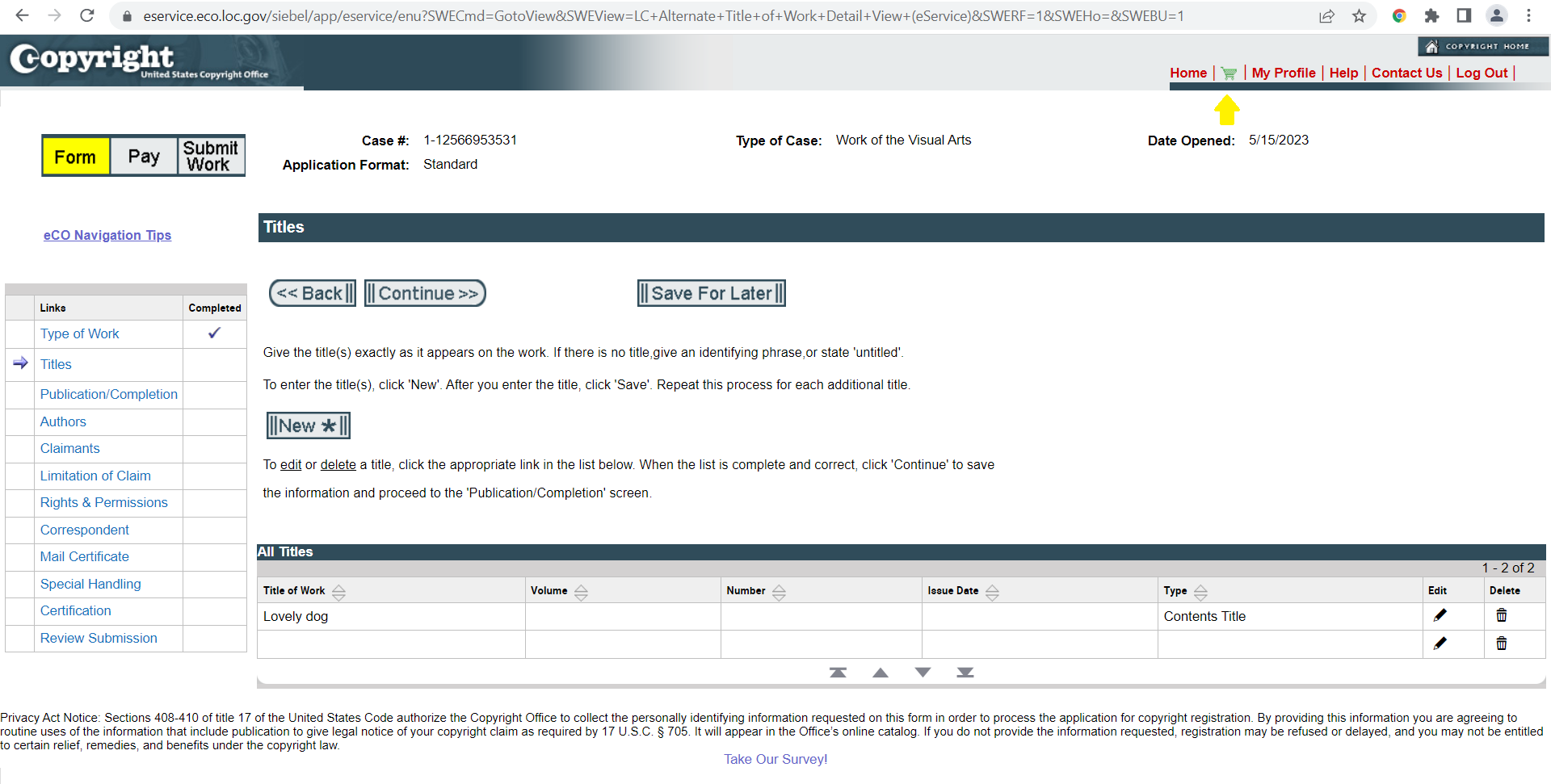
-
After paying the fees you will be able to upload your photo to the copyright office's archive. Now, all you have to do is wait for your letter of acceptance.
Keep in mind that misstatements on the application may result in fines of up to $2500. Take your time to fill out the application accurately.
For additional guidance on how to copyright your photographs, you can visit the U.S. Copyright Office’s website. They provide detailed instructions and downloadable forms to make the process even easier. Their FAQ section also answers common questions and addresses recurring inquiries.
7. Can you sue for copyright infringement without registration?
In most countries you will be able to file a copyright law suit without prior registration. In some important markets, such as the U.S. and Canada a copyright registration is a legal prerequisite to filing suit in court.
Conclusion
There is no general answer to whether or not you should register your copyright with the U.S. Copyright office or any other government institution. If you want the strong protection that comes with the opportunity to sue for statutory damages in the US, it is certainly worth the time and money investment to set up a continuous process for timely registration with the U.S. Copyright Office.
Copyright is a complex subject that many people may not fully comprehend. It's essential to educate yourself on the details of copyright. It's vital to safeguard yourself and your work.
We invite you to check out the Fair Licensing Copyright Guide to learn more about photography copyright.
Please note that a blog article like this can only provide some general guidance. It is important to discuss your individual approach with a qualified lawyer.
Do you find this article helpful? Share it with friends on social media.